GOLDEN FUND
In this section, the users can get acquainted with the Kazakh talents who have gained worldwide fame
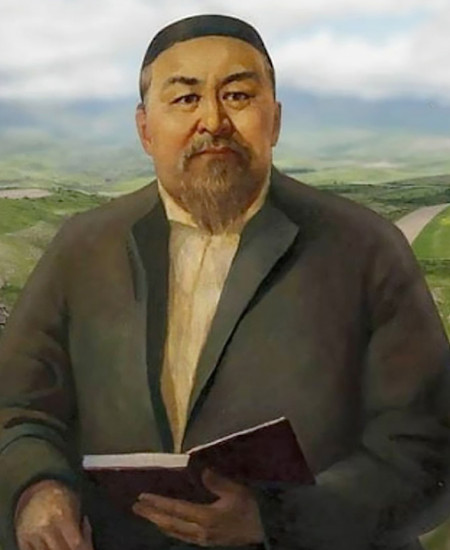
Abai Qunanbaiuly
Abai (Ibrahim) Kunanbaiuly (August 10, 1845 — June 23, 1904) was a Kazakh poet, philosopher, composer, educator, thinker, public figure, founder of Kazakh written literature and its first classic, cultural reformer in the spirit of rapprochement with Russian and European culture on the basis of enlightened liberal Islam.His real name is Ibrahim (Ibrahim is the Arabic name, an analogue of the name of the prophet Abraham), but the name Abai (In Kazakh, the word “Abai” means “attentive”, “careful”), given by his grandmother Zere, stuck with him for life. Also, Abai’s nephew is the famous Kazakh poet Shakarim Kudaiberdiuly.Abai Kunanbaiuly was born in the Chingiz intermountain of the Semei district of the West Siberian Governor-General (since 1845, Semei region, according to the current administrative division in the Abai district of the East Kazakhstan region) in the family of a large bai (rich man) Kunanbai Uskenbayev (Uskenbayev) of the Tobykty family from the Kazakh Argyn tribe. Abai’s family belonged to the local nobility; his grandfather (Oskenbai) and great-grandfather (Irgizbai) dominated their family as the rulers and biys (the judges, who dealt with disputes under Kazakh customary law).The home schooling that had started in his childhood by the mullah was continued at the madrasah of Akhmet-Riza mullah in Semei, where the Arabic, Persian and other oriental languages were taught as well. At the same time, he attended the Russian school. By the end of his five-year studies, he began to write the poetry, first attributing his authorship to his friend Kokpai Dzhantassov. Since the age of 13, Kunanbai’s father had begun to teach Abai for the activities of the head of the family. At the age of 28, Abai stepped away from this position, completely involving himself in self-education, but only by the age of 40, he had created his first adult poems. A significant event for Abai was his communication with the political Russian exiles E. P. Michaelis, N. Dolgopolov, S. Gross.The formation of Abai’s worldview was influenced by the poets and scientists of the East who adhered the humanistic ideas (Firdawsi, Alisher Navoi, Nizami, Fuzuli, Ibn Sina and others), as well as the works of Russian classics, and he learned the European literature through them. He translated the works of Krylov, Lermontov, Pushkin, Goethe and Byron.A story of the poem “Karangy tunde tau kalgyp” (The mountains slumber in the dark night), which became a folk song, is characteristic. Goethe wrote “Wanderers Nachtlied” (The Night Song of the Wanderer), Lermontov translated it into Russian (A mountain peaks sleep in the darkness of the night...), and half a century later, Abai Kunanbaiuly transmitted its contents into Kazakh language. He contributed for the spread of Russian and European culture among the Kazakhs. Subsequently, Turar Ryskulov followed his example.For some time, Abai had worked as an administrator of small administrative district.According to the literary critics, Abai ridiculed some of the customs of the ancestral village, spoke out “against the servile position of women” and “against the social evil and ignorance”.Abai Kunanbaiuly was an innovator of Kazakh poetry; the poems dedicated to the seasons are progressive: “Spring” (1890), “Summer” (1886), “Autumn” (1889), “Winter” (1888), and there are poems about the purpose of poetry (to teach the good and condemn the bad). The plots of the poems “Masgud” (1887) and “The Legend of Azim” are based on the motifs of oriental classical literature. In the “Iskander” poem, a reason in the personality of Aristotle and the greed of the conqueror in the personality of Alexander the Great are contrasted as well.In the history of Kazakh literature, Abai took an honorable place, enriching the Kazakh versification with the new sizes and rhymes. He introduced the new poetic forms, such as octagons, hexagons and others.Besides that, Abai created about 170 poems and 56 translations, wrote the poems and famous ones are “Words of Wisdom” (“Kara Sozder”).Abai Kunanbaiuly had a great influence on the Kazakh national intelligentsia of the late 19th − early 20th centuries. Thus, the leaders of the Alash-Orda movement perceived Abai as the spiritual leader of the revival of the Kazakh nation. Alikhan Bukeikhanov became the first biographer of Abai. His famous article “Abai (Ibrahim) Kunanbayev” — an obituary of the Kazakh national poet was published in the “Semipalatinsk Leaflet” newspaper in 1905. Then, with a portrait of Abai, it was published in the “Notes of the Semipalatinsk sub-department of the West Siberian Department of the Imperial Russian Geographical Society” journal in 1907.In 1914, the turkologist V.V.Gordlevsky selected Abai Kunanbaiuly and Mirzhakyp Dulatov as the prominent representatives of Kazakh literature to publish their texts in the “Oriental Collection”, issued in honor of the 70th anniversary of the famous orientalist and academician N. I. Veselovsky.It bears noting that Abai Kunanbaiuly is the pride of the country and a great Kazakh world-class thinker.
Read more →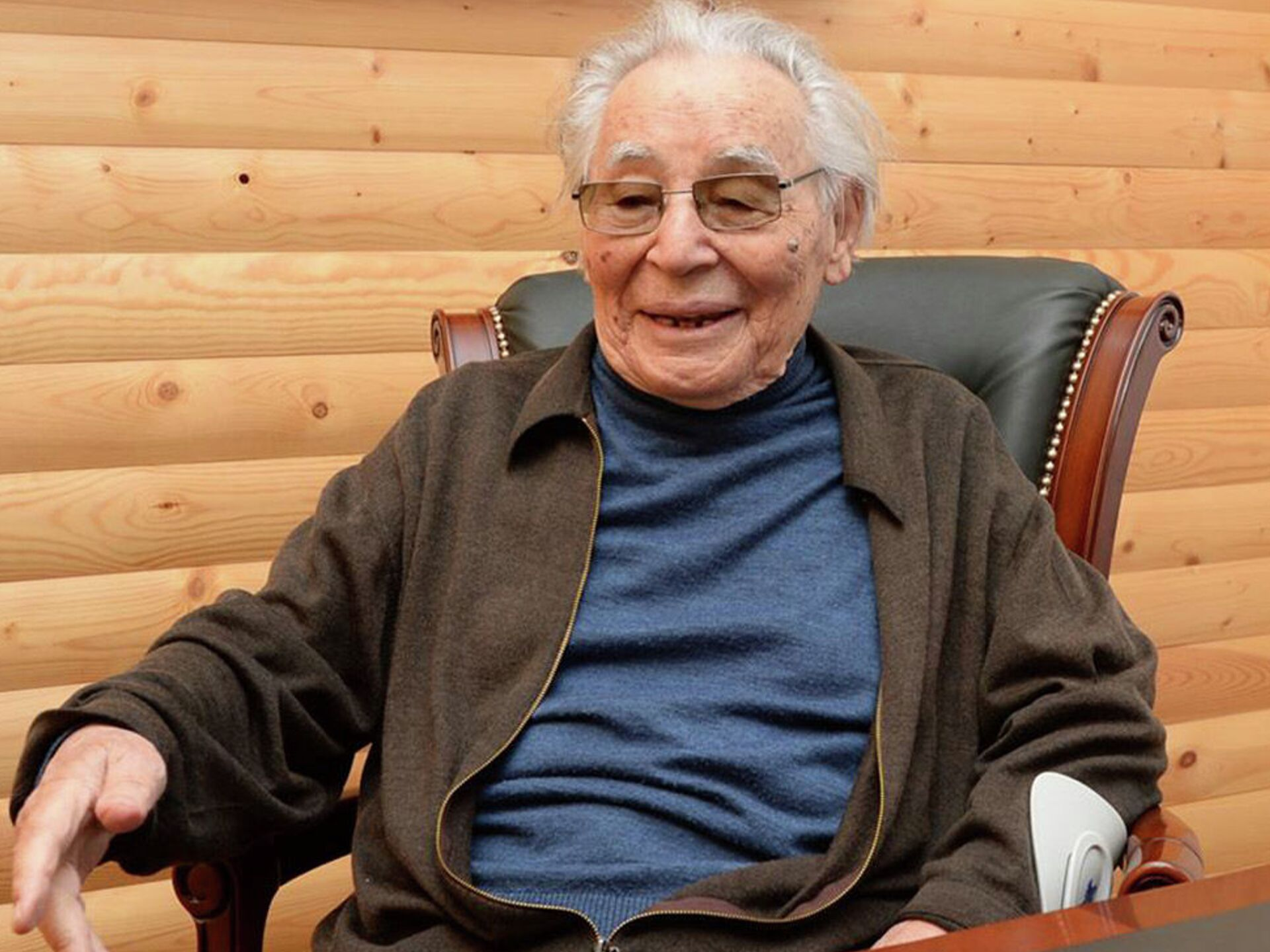
Abdizhәmil Nurpeyisov
Abdizhәmil Nurpeyisov – outstanding Kazakh writer, translator and public figure figure who left a deep mark on the literature of Kazakhstan. Born on October 22, 1924 in the Kyzylorda region, in the small village of Ushkon. From childhood, he absorbed the traditions of Kazakh culture, which was reflected in his creativity. During the Great Patriotic War, he fought at the front, joining the ranks CPSU(b) in 1943. The experience of war had a huge influence on his works. His literary career began with the novel “Courland”, later revised and published under the title “Blood and Sweat” - an epic about the life of the Kazakh people during the social shocks. In 2000 Nurpeisov published a dilogy novel “The Last Debt” touching acute environmental problem of the Aral Sea. This work received wide recognition and was awarded the Sholokhov Prize in 2003. The writer’s books have been translated into many languages, including French, German, Spanish, Chinese and Arabic, which indicates his international recognition. Along with his writing activities, Nurpeisov was a talented translator. He adapted the works of Anton Chekhov, Maxim Gorky, as well as the plays of the Spanish playwright Alejandro Casona and the Turkish poet Nazim Hikmet.In market times, he became the founder of the international Kazakh PEN Club and for many years remained its president, promoting the development of Kazakh literature abroad. Under his leadership, the literary and social magazine “Tan-Sholpan” was published, which became an important platform for modern Kazakh writers.For his outstanding work, Nurpeisov was awarded many awards, including the title of People's Writer of the Kazakh SSR (1985), the State Prize of the USSR (1974) and the highest award of the country - the title of Hero Labor of Kazakhstan (2019).Abdijamil Nurpeisov passed away on February 5, 2022. He left behind not only a rich literary heritage, but also an example of endless devotion to the art of words.
Read more →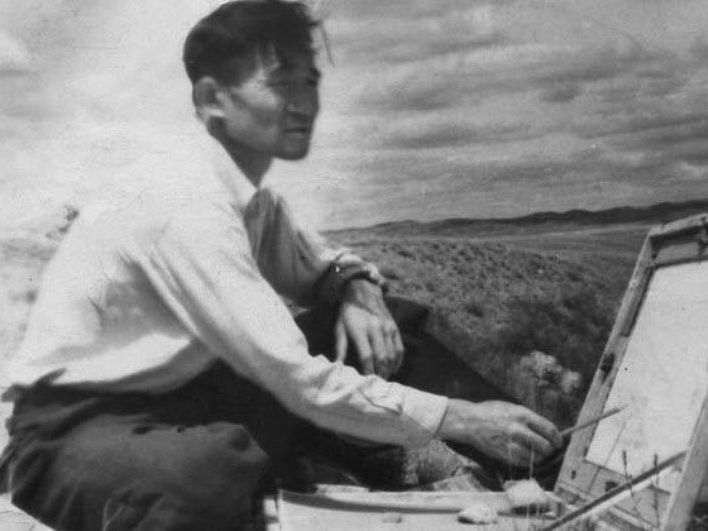
Abylkhan Kasteev
Abylkhan Kasteev (Abilkhan Kasteev) – founder of Kazakh painting, people's artist of Kazakh SSR, left a bright mark in the history of national art. His work reflects the life of the Kazakh people, its traditions, culture and nature. Born on January 4, 1904, in the village of Chizhin, located in the Semirechensk region (now Almaty region). He came from the Suan tribe of the Elder Zhuz. His journey in art began in 1929 when he entered the art studio of the famous Russian artist Nikolai Khludov in Almaty. Continuing to improve his skills, from 1934 to 1937 he studied at the Moscow art studio named after N. K. Krupskaya. Abylkhan Kasteev stood at the origins of the formation of fine arts Kazakhstan. In 1944 he was awarded the title of People's Artist of the Kazakh SSR. In 1954–1956 he headed the Union of Artists of Kazakhstan, actively participating in the development of the national artistic heritage. Being a deputy of the Supreme Council of the Kazakh SSR of several convocations, Kasteev made a contribution not only to art, but also to the public life of the country. Kasteev created many paintings dedicated to the life of the Kazakh people, rural labor and historical events. Among his famous works: Genre scenes: “Collective farm dairy farm”, “Milking mares”, “Cotton harvesting”, “Collective farm toy”, “Bride kidnapping”, “Bought bride”, “Golden grain”.Landscapes and industrial motifs: “Aksai Quarry”, “Medeo High Mountain Skating Rink”, “Turksib”, “Talas Valley”, “Kapchagai Steppe”.Portraits of outstanding personalities: Amangeldy Imanov, Kenesary Kasymov, Abay Kunanbaev, Chokan Valikhanov, Zhambyl Zhabaev, as well as his mother.His works are distinguished by deep expressiveness, attention to detail and love for his family earth.The creative legacy of Abylkhan Kasteev continues to inspire modern artists. Today his works are stored in the largest art museum of Kazakhstan – The State Museum of Arts of the Republic Kazakhstan, which bears the name of the master.Abylkhan Kasteev left life 2 November 1973 He was buried in Almaty at the Kensai cemetery, but his art forever remained part of the national culture of Kazakhstan.
Read more →
Aigul Ulkenbaeva
Aigul Ulkenbaeva is an outstanding Kazakh domplayer, kyushi and music teacher, who has made a significant contribution to the development of Kazakh instrumental music. The owner of many honorary titles, she devoted her life to the preservation and popularization of the national musical heritage. Born in 1962 in the Isatai district of the Guryev region. Musical talent manifested itself from childhood, which was facilitated by the creative atmosphere in the family – her father, Nariman Ulkenbaev, was a famous dombra player and composer. Aigul graduated from the Almaty Musical School named after P. I. Tchaikovsky, and then the Faculty of Folk Instruments of the Alma-Ata State Conservatory. In 1979 she began her professional career in the Kazakh State Academic Orchestra of Folk Instruments. Since 1993, she has been teaching at the Kurmangazy Kazakh National Conservatory, where she became a professor at the dombra department. In 2006, she opened her own music studio, promoting education of the new generation of kuishi. She is also an honorary member of the jury and chairman of the commission at republican and international competitions. Aigul Ulkenbaeva masterfully performs like folk kui, and works of classics of Kazakh music - Kurmangazy, Dina Nurpeisova, Dauletkerey, as well as modern compositions. Her work combines tradition and innovation, which makes her performing style unique. Aigul Ulkenbaeva’s concerts were held in prestigious halls of Kazakhstan, including the Abay Opera and Ballet Theater and the central concert hall "Kazakhstan". Her works have been released on several audio and video discs, including “Kүy — ana”, “Ak Sholpan”, “Kulagynnan ketpesin”. In 2011 her book “Kүy” was published Gumyr", reflecting the rich creative path of the artist. Today Aigul Ulkenbaeva remains a symbol of Kazakh kuy, inspiring new generations musicians and drawing attention to the national musical heritage.
Read more →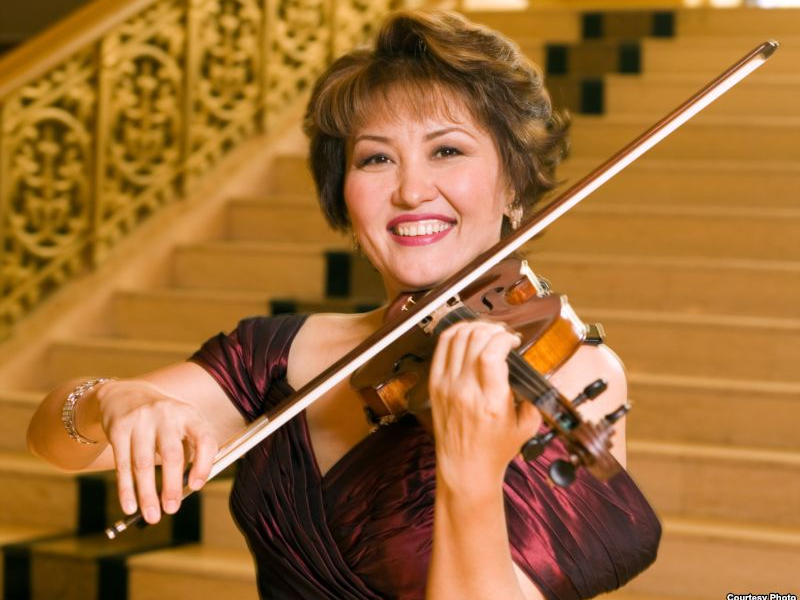
Aiman Musakhadzhaeva
Aiman Musakhadzhaeva is a woman whose violin sounds like the voice of the soul itself. Her art erases boundaries and fills the world music, capable of touching the most hidden in a person. The violin came into her life from an early age, and already at seven she confidently held bow, and at thirteen she captivated the audience with her virtuoso performance of Saint-Saëns. Teachers saw in her not just a talented student, but a future legend. Studying in Moscow with the outstanding professor Valery Klimov only honed her skills, turning a young talent into a true one. Studying in Moscow with the outstanding professor Valery Klimov only honed her skills, turning a young talent into a true one. But Aiman Musakhadzhaeva is not only a concert performer who has shone on the world's best stages. She is a teacher, a mentor, and a creator of musical traditions. Her "Academy of Soloists" and the Kazakh National University of Arts centers where new geniuses are brought up. Thanks to her, Kazakh music began to sound with renewed vigor, and young talents had the opportunity to enter the world stage. Her awards - Hero of Labor of Kazakhstan, People's Artist, winner of prestigious awards speak for themselves. But true recognition is the enthusiastic applause and bated breath of the audience, when she takes her violin. Her music is a story, told without words, but understandable to everyone.
Read more →
Aisultan Seitov
Aisultan Seitov is a talented Kazakh director and music video director, whose work has brought him international recognition. He is known for his unique visual style and work with major artists of the CIS countries. Aisultan was born on January 31, 1997 Almaty. After graduating from the Kazakh-Turkish Lyceum in Astana, he continued his studies at the New York Film Academy, where he specialized in directing. Already during his studies, his short film “Jackal” (2016) won an award for “Best director" at the Hollywood Boulevard Film Festival. Aisultan took his first steps in video making by shooting a video for the song Jaya Miyazaki “In the Wind.” The real breakthrough works were the videos for Moldanazar (“Zhanym Sol”) and Ninety One. The clip "Medina" for Jah Khalib, which became the most expensive music video in the history of Kazakhstan brought him enormous popularity. In 2018 he made a documentary “Charisma” about the duet MiyaGi & Endgame and in 2019 guest YouTube show "in Dud", where he spoke about his path in the film industry. Aisultan is also actively working in the gaming industry cinema. In 2020 he announced the launch of his first full-length film “Kash” with Erkebulan Dayyrov in the title role. Alexander Pal and Varvara Shmykova also participate in the project. Filmography Aisultan Seitov is one of the most prominent representatives of the new generation of Kazakh filmmakers, who actively popularizes Kazakh art on the world stage.
Read more →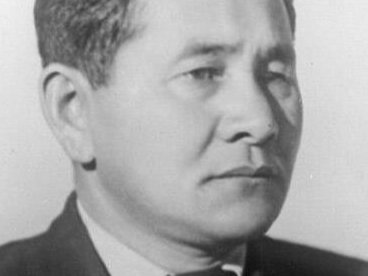
Akhmet Zhubanov
Akhmet Kuanovich Zhubanov (Zhubanov Akhmet Kuanuly) – outstanding Kazakh musicologist, composer, conductor, teacher and researcher of folk music. He not only recorded and preserved folk kuis, but also created an orchestra of Kazakh folk instruments, which became a symbol of national musical culture. Born on April 29, 1906 in the Kosuaktam tract (now Aktobe region). From childhood he showed an interest in music, receiving his first lessons from Kuysha Talym and the village teacher K. Ashgaliev. An important role in his development was played by the writer Zh. Tlepbergenov and his older brother, the linguist Kudaibergen Zhubanov. He received his musical education in Leningrad, studying at the M. Glinka Music College and the Glinka Conservatory N. Rimsky-Korsakov. After returning to Kazakhstan, he devoted himself to the development of national musical art. B 1933 compiled the first “Musical Primer” in the Kazakh language, and a year later created an ensemble of dombra players, which later became the State Orchestra Kazakh folk instruments named after Kurmangazy. He was the artistic director of the Kazakh Philharmonic, the rector of the Almaty Conservatory, taught the history of Kazakh music and conducting. Akhmet Zhubanov is the author of scientific works: “Kurmangazy”, “The Life and Work of Kazakh Folk Composers”, “Strings of Centuries”, “Nightingales of Centuries”. He also created the operas “Abai” and “Tolegen Tokhtarov”, symphonic poems, songs, music for plays and films. Among his students are famous musicians Shamgon Kazhgaliev, Nurgisa Tlendiev, Gulnafis Bayazitova, Fatima Balgaeva, Fuat Mansurov, Khabidolla Tastanov. Akhmet Zhubanov passed away on May 30, 1968, leaving an invaluable legacy in the culture and music of Kazakhstan.
Read more →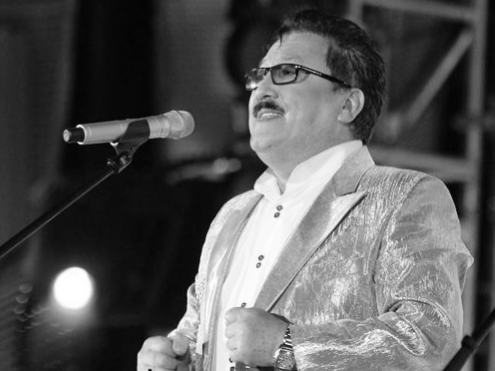
Akzhol Meyirbekov
Akzhol Nuskabekuly Meirbekov was born on July 7, 1950 in the city of Arys, Turkestan region. His parents father Nuskabek and mother Aisha. He graduated from high school named after K. Sypataev in Shymkent, after which he continued his studies at a music school in Namangan, Uzbekistan. Later he received higher education at the Tashkent Agricultural Institute, where mastered the specialty of an agronomist.In 1978 Akzhol Meyirbekov became a participant in the legendary ensemble "Dos-Mukasan". Since 1979 he performed as part of the creative association "Kazakhconcert". In the period from 1978 to 1985 he performed songs in composition of "Dos-Mukasan", after which he moved to the groups "Arkas", "Sazgen" and "Adyrna" at the Almaty Regional Philharmonic, where he worked until 1994. Then he took the position artistic director and director of the ensemble "Gulder", in which he worked until 1996. In 2001, he founded his own musical theater "Akzhol", and in 2010 he again joined ensemble "Dos-Mukasan".In 1972 Akzhol Meirbekov took part in the All-Union competition “Hello, we are looking for talents” in Moscow, where he performed the folk song “Aygolek” and won the Grand Prix. As part of the ensemble “Dos-Mukasan” he performed on tour in various countries and in all regions Kazakhstan. His repertoire included folk songs and works by Kazakh composers, such as “Nazkonyr”, “Ahau Bikem”, “On alty kyz”, “Sulu kyz”, “Kudasha”, “Auylyn senіn irgeli”, songs by famous authors: “Іnkar zhurek”, “Tugan zher”, “Asyl zharym” (Kenes Duysekeyeva), “Kiyaldagy eles” (Nurlan Sarsenbaev), “Keshir meni” (Kuat Shildebaev), “Apa sen kartaimasyn” (Zhangeldi Kenesov), “Pai pai kairan zhastyk shaq" (Әbi Botakaev) and many others.For his contribution to the development of Kazakh culture, Akzhol Meirbekov was awarded titles and awards. In 1994 he was awarded the title of Honored Artist of Kazakhstan. In 2005 he received the medal “Eren Enbegi Ushin” a in 2011 – Order “Kurmet”.25 November 2023 Akzhol Meyirbekov died, leaving behind a rich musical heritage, which continues to live in the hearts of Kazakh pop fans.
Read more →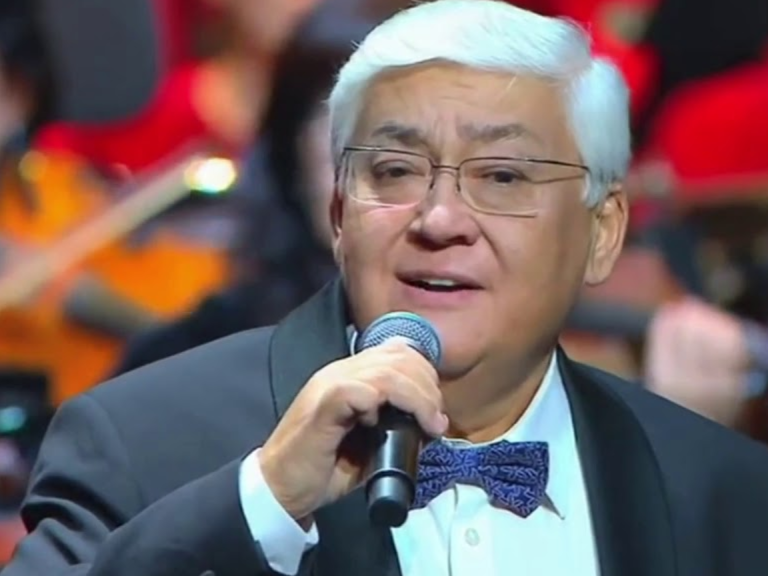
Alibek Dnishev
Alibek Dnishev is a legendary Kazakh tenor, whose name has become synonymous with high art and vocal mastery. Born in Alma-Ata in 1951, he dreamed of the stage since childhood. He began his first steps in music by playing the accordion, and then entered the conducting and choral department of the music school. After graduating from the Kazakh National Conservatory named after Kurmangazy, he quickly won class="leading-7 [&:not(:first-child)]:mt-6" dir="ltr" style="text-align: start;">recognition, becoming a laureate of prestigious vocal competitions.Dnishev’s stage career began in 1976 at the Kazakh State Philharmonic, and then continued at the Kazakh State Academic Opera and Ballet Theater named after Abai. His voice sounded at the best concert venues in the world, from the Bolshoi Theater in Moscow to the largest halls Europe. The singer’s repertoire covers a wide range of works – from Kazakh folk songs to classical arias and romances. The performance of Lensky’s aria from Tchaikovsky’s “Eugene Onegin” in his interpretation has become a standard, and his heartfelt romances fascinate with sincerity and depth.Alibek Dnishev is not only an outstanding performer, but also a teacher, dedicated to educating new generations of vocalists. In 1998 he founded The Academy of Vocals, which has become the center of music education in Kazakhstan. He plays an important role in the development of national culture, and his contribution to art has been awarded the highest state awards - the title of People's Artist of the USSR, Hero of Labor Kazakhstan, Orders "Otan" and "Parasat".Today Alibek Dnishev continues to delight the audience with his performances, remaining an example of dedication to art, a symbol of the Kazakh opera school and the true voice of its people.
Read more →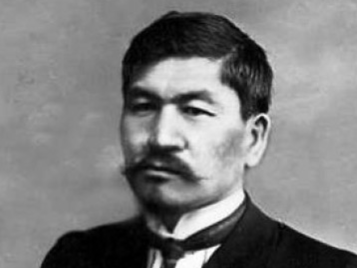
Alikhan Bokeikhan
Alikhan Nurmukhameduly Bokeikhan (1866–1937) – Kazakh state, political and social activist, teacher, journalist, ethnographer. One of the founders of the “Alash” party and chairman of the government of Alash autonomy (1917–1920), in modern historiography is considered the first prime minister of Kazakhstan.He was a member of the Central Committee of the People's Freedom Party(cadets), a deputy of the State Duma of the Russian Empire 1st convocation. In 1917 he served as Commissioner of the Provisional Government for Kazakhstan.He left a significant scientific and journalistic legacy, including research about the Kazakh people, the national movement and the resettlement policy of Russia. His works were included in the 15-volume collected works (Astana, “Alashorda” Kogamdyk Kory, 2017–2020).In 1937 he was repressed and executed in the Butyrka prison in Moscow. Today Bokeikhan is recognized as one of the key figures of the Kazakh national revival.
Read more →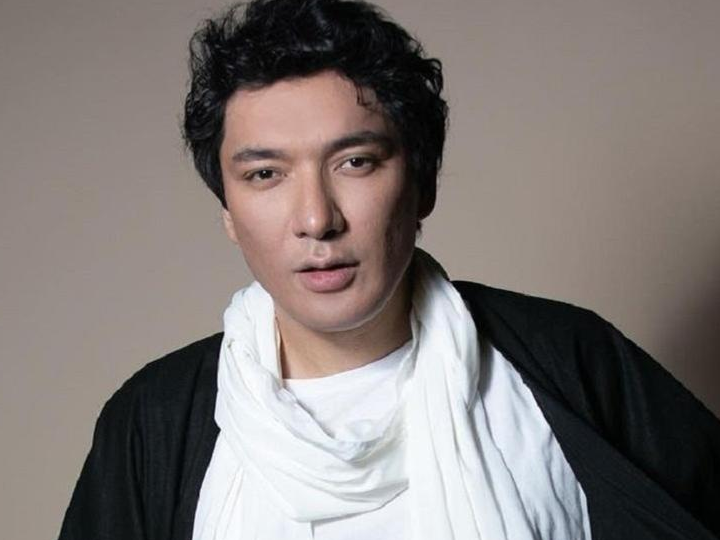
Alisher Karimov
Alisher Karimov is a Kazakh pop singer whose work unites different cultures and musical traditions. From early childhood he showed talent for vocals and walked confidently to his dream, becoming one of the most recognizable performers in Kazakhstan. Alisher's career began with a victory at a children's competition "Onshi balapan", but he gained real fame in 2005 when he became a finalist of the “SuperStar KZ” project. From that moment his path to professional recognition began. He represented Kazakhstan at major international vocal competitions, such as Slavic Bazaar, New Wave, Yerevan Calling, winning high places and winning the hearts of audiences around the world. His success on stage was complemented by participation in television projects. Alisher tried himself as a co-host on the channel Khabar and also actively developed his solo career, holding concerts in Kazakhstan and beyond. He received international recognition, performing at festivals throughout France, Turkey and Bulgaria. Special attention should be paid to his participation in the show "The Voice", where he became super-finalist, once again proving his skills. Thanks to his unique voice, stage charm and talent, he managed to attract the attention of both Kazakh and international audiences. Alisher’s creative activity was marked with the sign “Honored Worker of the Republic of Kazakhstan”, as well as a number of state awards, including medals “25 Anniversary of the Assembly of the People of Kazakhstan” and “Halyk Algysy”. Today Alisher Karimov is not just a performer, but an artist who makes a significant contribution to the development of pop music, representing Kazakhstan on the international stage and inspiring young people musicians.
Read more →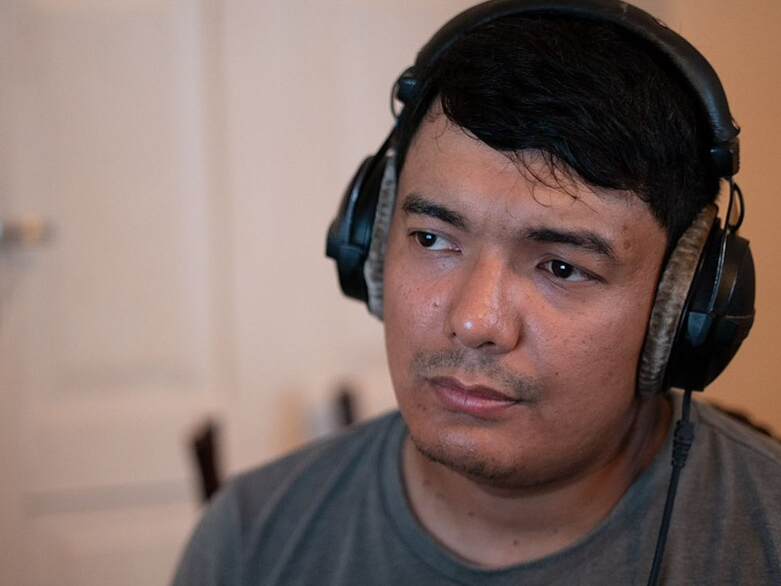
Alisher Utev
Alisher Utev is one of the most successful and sought-after directors, screenwriters and producers in Kazakhstan. His name is associated with hits. Kazakh cinema, and his projects invariably attract millions of viewers.Having started his creative career in KVN, he quickly moved into the film industry and television, working on cult humorous shows and series. In 2016 his script for the film “Business in Kazakh” laid the beginning of the country’s highest-grossing franchise.As a director, Alisher made his debut with the comedy “Brother or Marriage 2,” and in 2021 conquered the Internet space with web series “Sergeant "Bro" and "5:32", which became real phenomena of Kazakhstan's YouTube. His ability to create stories that resonate with viewers has earned him a reputation of a "millionaire screenwriter."In 2023 he continued to conquer the industry with the web series "1286", proving that Kazakhstani content can be not only popular, but also of high quality. Alisher Utev is a man, who is forming a new wave of Kazakh cinema, combining commercial success with the author's vision.
Read more →
Altynbek Korazbaev
Altynbek Korazbaev is an outstanding Kazakh composer, singer and teacher, who made a significant contribution to the development of the Kazakh music. Born February 1 1948 in the village of Kyzylsay, Merken district, Zhambyl region. Since childhood, he was surrounded by music: his maternal relatives were akyns. In his youth, he mastered playing the Russian harmonica, later – on the dombra, which predetermined his future path.Korazbaev received his professional musical education in Dzhambul cultural and educational school, and then in 1973 graduated from the Alma-Ata State Conservatory named after Kurmangazy. After that, he headed the pop ensemble "Alatau", which became widely known both in Kazakhstan and beyond its borders. Later he led Zhambyl regional philharmonic, was engaged in teaching activities and headed cultural institutions in Taraz and Almaty.Since 2003 Altynbek Korazbaev is the head of the Kazakh State Touring and Concert Association "Kazakhconcert".His songs have become an integral part of Kazakh music culture. Among the most famous compositions are “Ayauly Tarazym”, “Kenen ata”, “Syrgalym”, “Kara kempir”, “Kara shal”, “Boztorgai”, “Shashbaulym”, “Agugay, dombyra”, “Sagyndym Kenen atamdy”, “Akmonshakty auym”, “Zhiyrma bes”, “Ushkonyr”, “Saryarka”, “Elge salem” and many others.One of the most significant works of Korazbayev was the song" Sagyndym Almatymdy ", written by him in the age of 24. It became the musical calling card of Almaty and was performed by such famous artists as Valentina Tolkunova, Roza Rymbaeva and "MuzART" group (Meirambek Bespayev, and art, Altynbek Korazbayev has received many awards:- People's Artist of Kazakhstan (1993)- Honored Worker of Culture of the Kazakh SSR (1990)- People's Artist of the Kyrgyz Republic (2024)- Laureate of the State Prize of Kazakhstan (2004)Korazbayev’s work remains in demand and loved the public, his songs are heard on the stages of Kazakhstan and beyond, conveying the spirit and traditions of the Kazakh people.
Read more →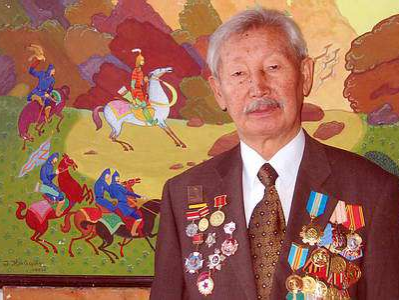
Amen Khaidarov
Amen Abzhanovich Khaidarov is the founder of Kazakh animation, an outstanding director, animator, graphic artist and public figure figure. Born on June 3, 1923 in Akmola province. In 1941 he went to the front and participated in the Battle of Stalingrad. In 1943 he was seriously wounded near Kiev and suffered several operations. After the war, he devoted himself to art. In 1950 graduated from the Almaty Art School and began working as a cartoonist and graphic artist and a poster artist in the magazine "Ara-Shmel". In 1965 completed his studies at the animator department at VGIK in Moscow, in 1966 – directing courses. From 1966 to 1975 he worked as an artist, a director, and then an artistic director of the animation workshop of the Kazakhfilm film studio. In 1975–1983 Secretary of the Union of Cinematographers of the Kazakh SSR, in 1983–1991 Chairman of the Union artists of the Kazakh SSR. Amen Khaidarov – author of the first Kazakh animated films, among which:“Why does a swallow have horns on its tail?” (1967) - the first Kazakh animated film based on a folk tale."The Lame Kulan" (1968) - animation in a unique style, based on the historical legend."Forty Tales" (1974) - a cartoon, created based on Kazakh folklore. The work of Amen Khaidarov played an important role in the formation and development of the national animation, and his works contributed to the popularization of Kazakh culture in the world. He was awarded the titles of Honored Artist of the Kazakh SSR and laureate of the State Prize of the Kazakh SSR.He was a member of several creative unions:Union of Artists of KazakhstanUnion of Cinematographers of KazakhstanUnion of Journalists of KazakhstanUnion of Designers of Kazakhstan.Amen Khaidarov died 4 February 2015 in Almaty. He will forever remain in history as the founder of Kazakh animation.
Read more →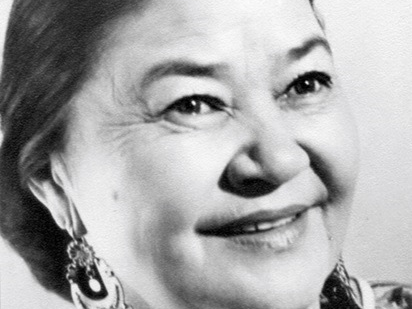
Amina Umurzakova
Amina Umurzakova is an actress whose name has become a symbol of Kazakh cinema. Her image of a mother, carried through dozens of films, remained forever in the hearts of the audience. Born in 1919 in the Abay region. After graduating from theater school worked at the Chimkent Drama Theater, and then at the Academic Drama Theater named after M. Auezov. However, due to political repression, her career was cut short, and Amina was forced to work as an assembler at Kazakhfilm. Fate smiled on her in 1945, when director G. Roshal was looking for an actress for the main role in the film “The Song of Abai.” Her expressive eyes captivated the director, and he insisted on her participation, despite the doubts of her colleagues. Thus began her star journey. Working at the Theater for Children and Youth, Umurzakova continued to act in cinema. Her greatest fame brought her role in the film "A Mother's Tale" (1963), where she conveyed the full depth of maternal love and suffering. For this work, the actress received an award for best actress at the All-Union Film Festival. Her filmography includes dozens of works: “Angel in a Skullcap”, “Beardless” deceiver", "Scarlet poppies of Issyk-Kul", "Mama Rose". For her contribution to art, she was awarded the title of People's Artist of the Kazakh SSR. In the last years of her life, the actress never ceased to be active, appeared on television, gave interviews, participated in cultural events. She was awarded prestigious awards, including the Order “Otan”. Amina Umurzakova passed away in 2006, but her talent and her screen images remained eternal. Her gaze, filled with maternal wisdom, continues to live in every frame, in every film, in every story, told with love.
Read more →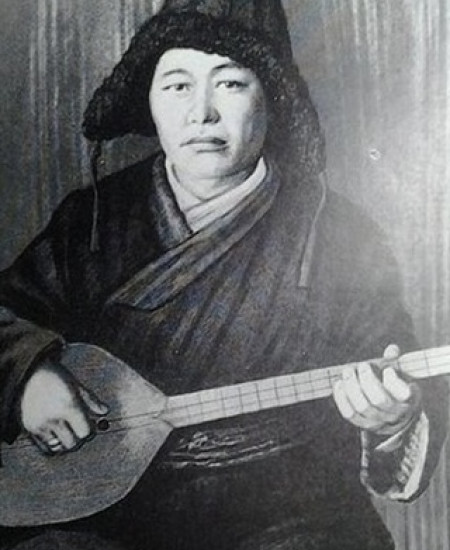
Amre Kashaubayev
Amre Kashaubayev (1886–1934) was a Kazakh singer and musician, one of the first performers of Kazakh folk music on the international stage. He was born in 1886 in the Semipalatinsk region and showed talent for singing and playing the dombra from a young age. Possessing an outstanding voice and a special manner of performance, he became known as one of the best Kazakh singers of his time.In 1925, Amre Kashaubayev presented Kazakh culture at the International Exhibition of Decorative Arts in Paris. His performance caused a sensation among the European public, and his virtuoso performance of Kazakh folk songs allowed him to take second place among the vocalists of the competition. This event became historical, as Kazakh music was presented on the international stage for the first time.Thanks to his talent and unusual manner of performance, many foreigners first got acquainted with the Kazakh musical tradition. His performances abroad became a symbol of the popularization of Kazakh art and culture. Despite his difficult fate, he left a deep mark on the history of Kazakh music. In Kazakhstan, a feature film “Amre” (2018) was filmed about him, telling about his life and success in Paris. Today, his name is associated with the revival and preservation of national musical culture, and his work continues to inspire new generations of performers.
Read more →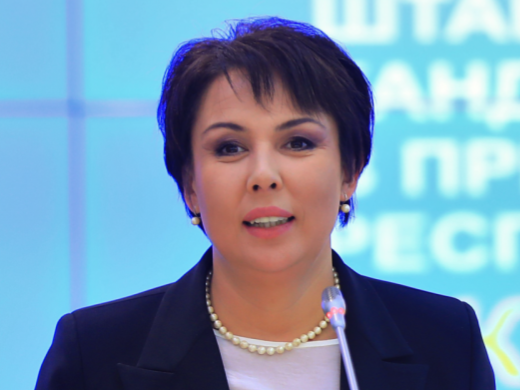
Aruzhan Sain
Aruzhan Sain is a Kazakh TV presenter, actress, producer, public figure and entrepreneur. From 2019 to 2023 she held the post of Commissioner for Children's Rights in Kazakhstan, actively protecting the interests of children. Born in Kyzylorda, graduated from the Kazakh gymnasium in Almaty. In her youth, she won republican Olympiads in geography, and then entered the Faculty of Geography of Kazakh State University. Since 1994 she worked on television, becoming presenter of popular programs “Fast and Tasty”, “Erkemai”, “Mom’s School”, “Give Children Life” and others. In 2006 founded the charitable foundation "Voluntary Society Mercy", which provides support to orphanages and helps seriously ill children. For her active social work she was awarded the "Altyn Zhurek" and "People's Favorite" awards of the Year", and also awarded the Order "Kurmet". She starred in films "1997. Records by Rustem with pictures" and "Student". Made a significant contribution to the development of charity and social support in Kazakhstan.
Read more →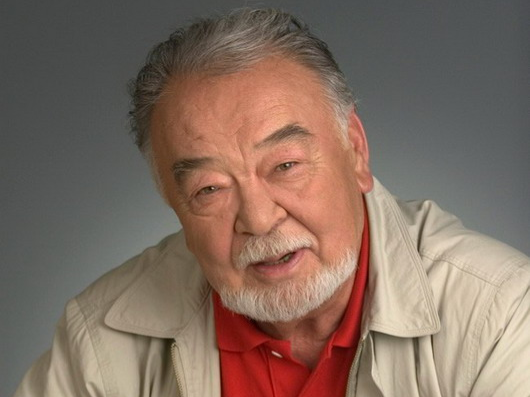
Asanali Ashimov
Asanali Ashimov – a legend of the Kazakh theater and cinema, actor, director, screenwriter, teacher and Hero of Labor of Kazakhstan.Born In 1937 he graduated from the theater department of the Kazakh Conservatory, and since 1963 has connected his fate with the Kazakh Drama Theater named after M. Auezov. On stage he created about 50 roles and worked with outstanding masters of the stage.His cinematic career began with the film "Botagoz" (1958). The roles in films "Kyz Zhibek" (1970) and "The End of the Ataman" (1973), where he played the security officer Chadyarov. This character became a cult, and his adventures continued in the films "Trans-Siberian Express" (1977), "The Manchurian Variant" (1989) and “Who are you, Mr. Ka?” (2009).As a director, Ashimov made the films “Year of the Dragon” (1981), “Legendary Chokan” (1985), “Wormwood” (1986), “Goats Korpesh — Bayan Sulu”In 2017 he completed the theater career, but his contribution to the arts remains significant. His work continues to inspire new generations of artists and audiences.
Read more →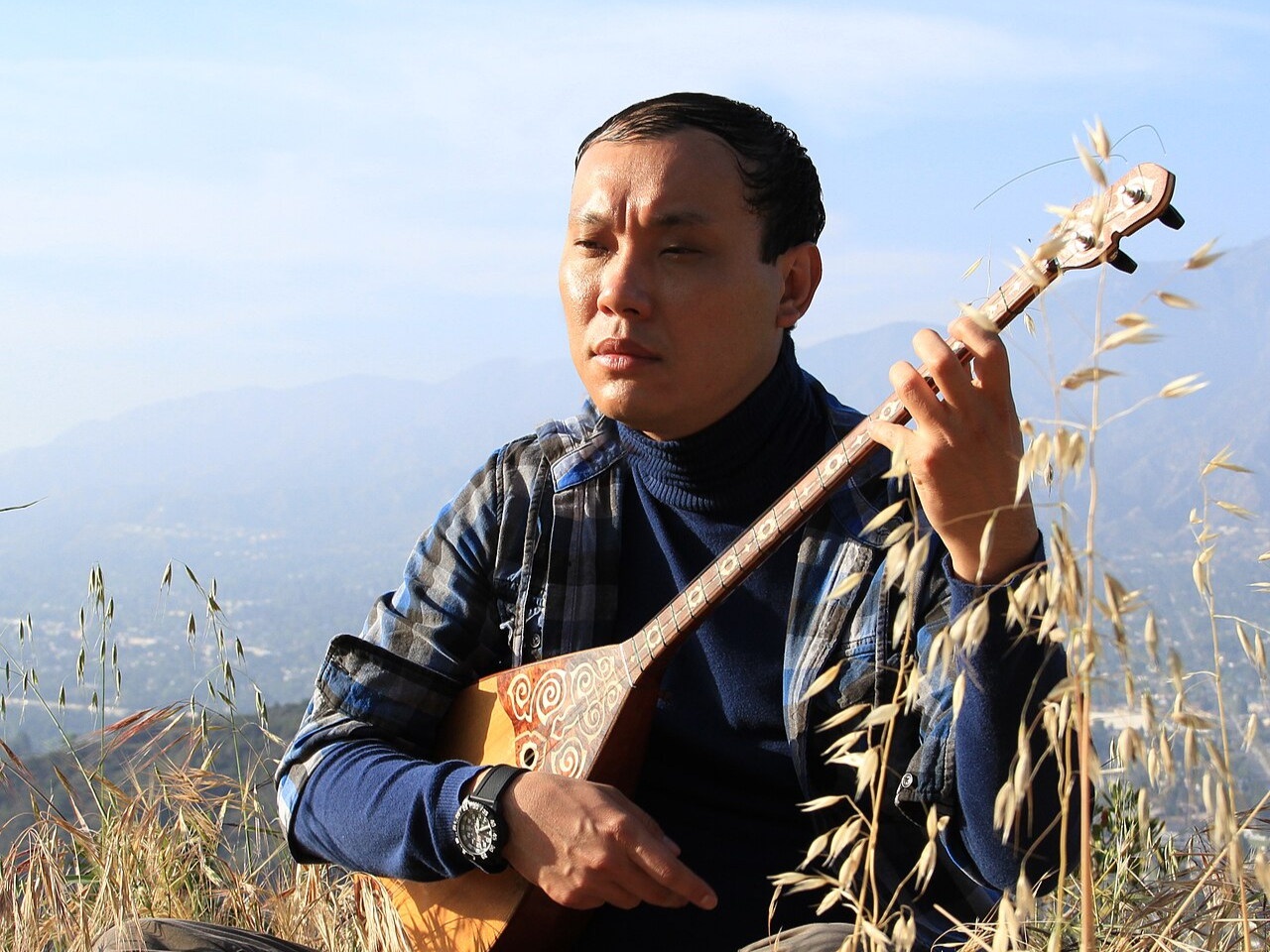
Asylbek Ensepov
Asylbek Zhasaraluly Ensepov was born on April 5, 1980 in Aktyubinsk. He comes from a family Shects of the Alimuly tribe. The first music teacher was his father - composer Zhasaral Ensepov. At first Asylbek studied the game on the violin, but later switched to dombra. He graduated from the music school named after Akhmet Zhubanov, and then in 2000 Kazakh National Conservatory named after Kurmangazy. Since 1999, he began performing as a solo artist. Together with his father, he develops the DECKO style, which combines dombra, pop, kyu, computer arrangement and performance (horns). In 1990 received the Grand Prix of the Republican competition of dombra players among youths. In 1992 became a scholarship recipient of the Kazakh Foundation cultures “New names”. In 1998 won the Grand Prix of the international festival of pop and folk music “Issyk-Kul” in Kyrgyzstan, became the winner of the International Competition named after Kurmangazy and laureate of the Republican Festival of Creative Youth “Shabyt”. In the same year he received the prize of the Youth Union of Kazakhstan. In 1999 he became the winner of the television festival “Song of the Year — Golden Disc” in the nomination “Discovery of the Year”. In 2003 he won the independent award “Platinum Tarlan” in in 2004 received "Tarlan" award, and in 2005, the state award "Daryn". In 2009, he was awarded the music award of the MuzZone TV channel for the best album. year. In 2016 he was awarded the title “Honored Worker of Kazakhstan.” Released several albums, “Adai” (1998) and “The Great Silk Road” (2006). Asylbek Ensepov actively tours, representing Kazakh culture abroad. In 2011 he performed a solo concert in Minsk. Asylbek Ensepov is an innovator who brought modern arrangements and electronic elements to the sound of traditional dombra. His style has become the hallmark of modern Kazakh instrumental music, and his contribution to the popularization of dombra is invaluable.
Read more →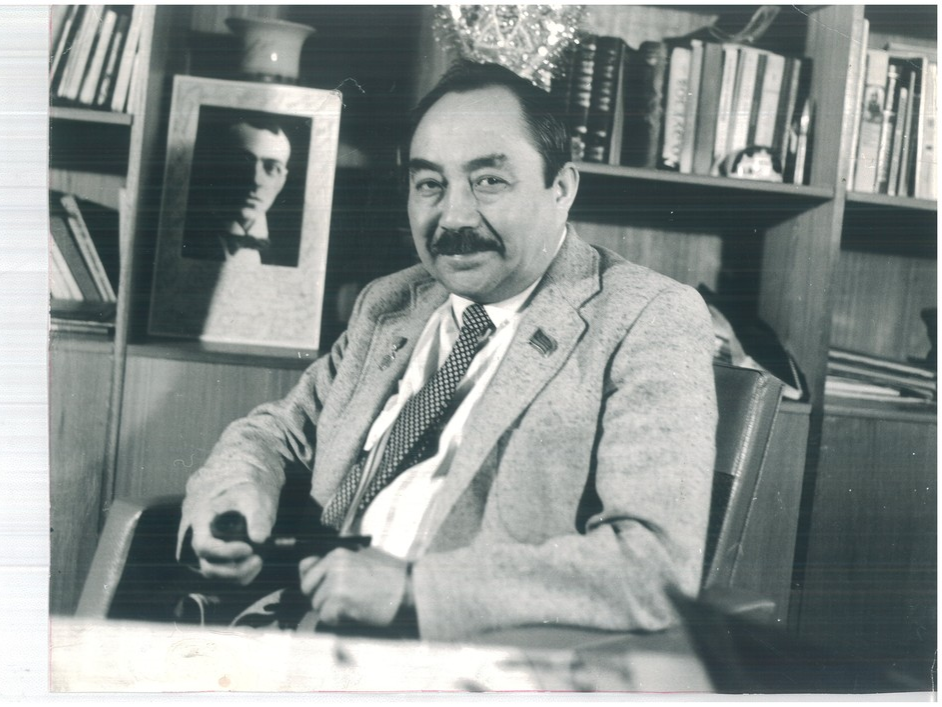
Azerbaijan Mambetov
Azerbaijan Mambetov is a legendary director, teacher, People's Hero of Kazakhstan and People's Artist USSR. A man whose name is forever inscribed in the history of theater and cinema of Kazakhstan. Born on September 2, 1932, in the village of Savinka (now the Volgograd region, Russia). During the war, his family moved to Alma-Ata, where his path to art began. Already in his youth he showed outstanding abilities – graduated from the acting department of the Alma-Ata Theater and Art School and at the same time from the choreographic school. He was a soloist of the Song and Dance Ensemble of the Kazakh SSR. Having received a director's education at GITIS, he immediately declared himself as a talented director. He worked at the Kazakh Academic Drama Theater named after M. Auezov, where in 1965 he became the main director. later and director. Over the years, he staged more than two hundred performances, many of which became iconic. In 1978, having temporarily left the theater, he headed the Kazakhfilm film studio, and then returned to theatrical activities. His productions were performed not only in Kazakhstan, but also on international stages. Moscow, Prague, Tashkent. His play “Mother Field” Chingiz Aitmatov was presented at the International Festival in Iran and “Goats Korpesh – Bayan Sulu” – on festival “Theater of Nations” in France. Azerbaijan Mambetov not only created great performances, but also raised a whole generation of talented actors and directors. He taught at the Kazakh National Academy of Arts, where he was considered a mentor and inspiration. He was public activist, was elected three times as a deputy of the Supreme Council of Kazakhstan, worked in the Union of Theater Workers. In 2000, he was awarded the highest state award - the title of People's Hero of Kazakhstan. November 18, 2009, he passed away. But his creativity and contribution to culture continue to live in the hearts of people, on theater stages and screens. Azerbaijan Mambetov is a director who changed the face of Kazakh theater and left a legacy that inspires new generations.
Read more →
Batyrkhan Shukenov
Batyrkhan Kamaluly Shukenov (May 18, 1962 – April 28, 2015) was a Kazakh singer, musician, composer and saxophonist, one of the most recognizable and beloved artists of Kazakhstan. He was the first soloist of the legendary group “A’Studio”, and later successfully performed as a solo artist. His voice, filled with warmth and sincerity, became a symbol of romance and soulful music.He was born in the city of Kyzylorda. From childhood he showed interest in music, studied playing the saxophone. Later he entered the Almaty State Conservatory, where he continued his musical education. In 1983 he joined the ensemble “Aray”, where he worked with Roza Rymbaeva, and already in 1987 together with Baigali Serkebayev and other musicians he created the group “Alma-Ata”, later renamed to “A’Studio”.In 1989, “A’Studio” gained all-Union popularity after performing the hit “Julia”, which became the hallmark of the group. Batyrkhan Shukenov was not only a vocalist, but also the author of many songs of the group, combining pop music, jazz and national motifs in his work.In 2000, he left “A’Studio” and began a solo career. His solo projects were dedicated to Kazakh culture and folk music, he performed songs in Kazakh, including “Otan Ana”, “Sagym Dunie”, “Elim Menin”. He also recorded several albums, including “Otan Ana” and “Batyr LIVE”.Over the years of his career, he repeatedly received state awards, was an advisor on culture to the President of Kazakhstan and represented the country on the international stage. His sudden death in 2015 was a huge loss for Kazakh music.Batyrkhan Shukenov left behind a rich musical legacy. An annual competition of young performers “Batyr Music Awards” is held in his honor, and his songs continue to sound in the hearts of millions of listeners.
Read more →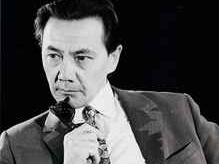
Baygali Dosymzhanov
Baygali Dosymzhanov is a name that will forever remain in the history of Kazakh opera. A man with a unique voice, charisma and deep love for art, he became not just a singer, but a symbol of an entire era. Born in 1920 in Semipalatinsk. Music entered his life from an early age, and he devoted himself to it without reserve. He studied in Alma-Ata, then at the Moscow Conservatory, learning vocal skills under the guidance of the best teachers. Since 1944, he becomes a soloist of the Kazakh Opera and Ballet Theater named after Abai. His his voice expressive, soft, with a wide range fascinated the listeners. He did not just perform the parts, he lived them, making each role unique. He popularized Kazakh folk songs, filling them with new depth and emotion. But his talent was not limited to the stage. 1960s he begins to work as a director, and from 1964 he becomes the main director of the theater, introducing new ideas, shaping a style, creating productions, which became events. Subsequently, he passed on his knowledge to young artists, heading the department of opera training at the conservatory, where he educated an entire generation singers. Tours, recognition, awards – he was in demand not only in Kazakhstan, but also far beyond it outside. His art was known in Europe, Asia, Canada. His voice sounded on the best stages, and his productions sold out. Baygali Dosymzhanov lived a life filled with creativity, passion for music and boundless dedication to his work. He left behind a legacy that still inspires and delights.
Read more →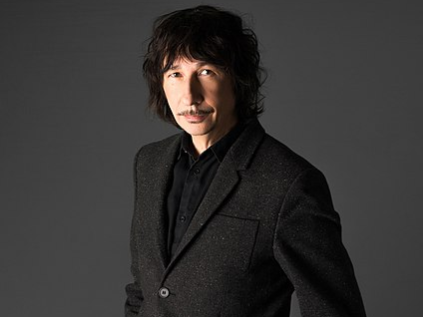
Baygali Serkebaev
Baygali Serkebaev is a famous Soviet and Kazakh musician, pianist, arranger and author songs. Born in 1958 in Almaty in the family of the famous opera singer Ermek Serkebaev. The father dreamed for Baigali to become a classical musician, and from the age of five the boy began to study piano. After graduating from the conservatory, he began working in the group "Arai" under the leadership of Roza Rymbaeva. Musicians Batyrkhan Shukenov and Vladimir joined the team In In the late 1980s, Serkebaev and his colleagues founded the group Almaty, which later transformed into A-Studio. Their first album "Alma-Ata-Studio" combined genres new wave and funk with elements of Kazakh folk music. The breakthrough was the hit “Julia,” which was heard by Philip Kirkorov. Alla Pugacheva invited the group to “Christmas Meetings,” after which “A-Studio” became popular throughout the USSR and Russia. Since then, the group has remained one one of the most successful pop groups, and Baygali Serkebaev is its permanent leader.
Read more →
Bazhan Oktyabr
Bagzhan Oktiyabr is the most popular young cellist in Kazakhstan, a virtuoso, whose music captivates and captivates the hearts of listeners. His talent, impeccable skill and deep emotional performance make him one of the brightest representatives of the new generation of classical musicians. From a young age, Bazhan showed outstanding abilities, and his stage performances are always something more than just music. He combines tradition and modernity, creating unique interpretations of classical works and experimenting with new musical forms. His art knows no boundaries: he performs on prestigious international stages, collaborates with famous orchestras and continues to popularize cello art among a wide audience. Baghzhan October is a name that is already inscribed in the history of Kazakhstani music and sounds every year increasingly louder on the world stage.
Read more →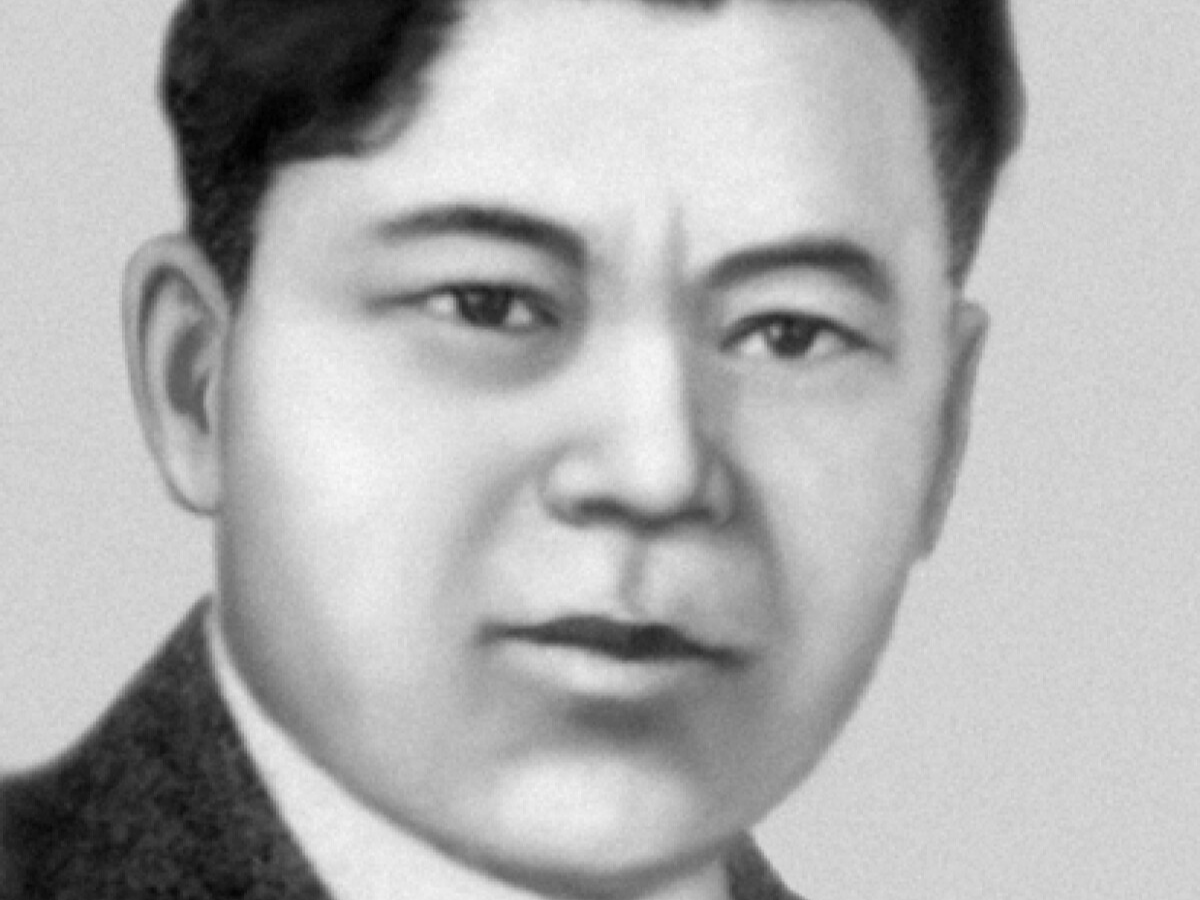
Beimbet Maylin
Beimbet Mailin(1894-1938) - Kazakh writer, poet and playwright, one of the founders Kazakh Soviet literature. His creative path began with poems, the first of which, "Dumas", was published in the magazine "Aykap" in 1914 In his poetic works, he described the life of ordinary people, social injustice and the hard lot of labor people.In 1916, Mailin responded to the events of the national liberation uprising with the poem "Bloody Fog." revolution, he wrote works in which he expressed hopes forchanges. The formation of Soviet power became an important theme of his work, which was reflected in verses, poems and prose.Beimbet Maylin made a significant contribution to the development of Kazakh prose, especially the short story genre. Among him the most famous stories: “Eighty Rubles”, “Ayranbai”, “The Damn Pacer”, “Chairman of the Kamil Collective Farm” and “Shapai’s Letter”. In his works he realistically depicted the fate of the poor, changes in the life of the Kazakh village, collectivization and the fight against the remnants of the past.Mailin's first story was "Shuganyn belgisi" ("Monument to Suga"), published in 1915 It tells about the tragic fate of a Kazakh girl, forced to submit to traditions. Later in his works, he repeatedly raised issues of equal rights for women and social change.One of the writer’s significant works was the novel “Azamat Azamatovich” (1935), reflecting changes in Kazakh society during the era of socialism. Mailin also actively developed Kazakh drama, writing the following plays such as Mulla Shanshar, Betrothal, Front, Zhalbyr and Our Horsemen.
Read more →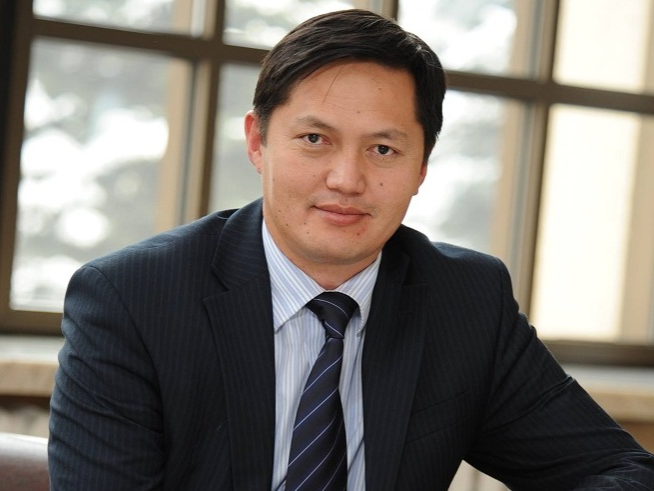
Beisen Kuranbek
Beisen Kuranbek (1971–2020) - Kazakh journalist and TV presenter. Born December 9 1971 in the village of Kyzylzhar, Kerbulak district, Almaty region. Graduated from the Kazakh Faculty of Journalism Al-Farabi National University. Began his career as a correspondent and executive secretary of the newspaper "Sport", then worked on TV channels "Rakhat", "31 channel", "Khabar" and at the Presidential TV and Radio Complex. In 2007–2012 and 2014–2020 he was General Director Almaty regional TV channel "Jetisu". From 2013 to 2017 led the author's program "Aituga onai" on TV channel "Qazaqstan", in which he raised socially significant issues and helped people solve their problems. Winner of the President of Kazakhstan Prize in the field of media (2006), awarded a medal “Eren Enbegi Ushin" (2016).
Read more →
Bekzhan Turys
Bekzhan Asaubaevich Turys was born on February 15, 1965 in the village of Shoshanai, Uyghur region Almaty region. In 1987, he graduated from the Kazakh State Institute of Theater and Cinema named after T. Zhurgenov with a degree in theater and film actor. Since 1990, Bekzhan Turys has been an actor at the Kazakh State Academic Drama Theater named after M.O. Auezov. Over the years, he has played many bright roles, demonstrating a high level of acting skill and deep immersion in the characters. Bekzhan Turys is especially known to the wide to the public for his work in television programs and series. He participated in the projects “Zhetpis zheti kun”, “Yat Bolmasyn” (in the role of Akylbay Shala), “Erkektin aty erkek” and many others. One of the most popular works was the series “Bazarbayevtar” (“Bazarbayevs”), where the actor won the love of the audience thanks to his talent and charisma. For his contribution to the development of Kazakh art, Bekzhan Turys was awarded a number awards. In 2004 he became the laureate of the State Youth Prize “Daryn” and in 2009 he was awarded the honorary title “Honored Worker of Kazakhstan”. These awards were recognition of his outstanding services to the national theater and cinema. The actor continues to actively work in theater and cinema, delighting audiences with new roles and creative experiments.
Read more →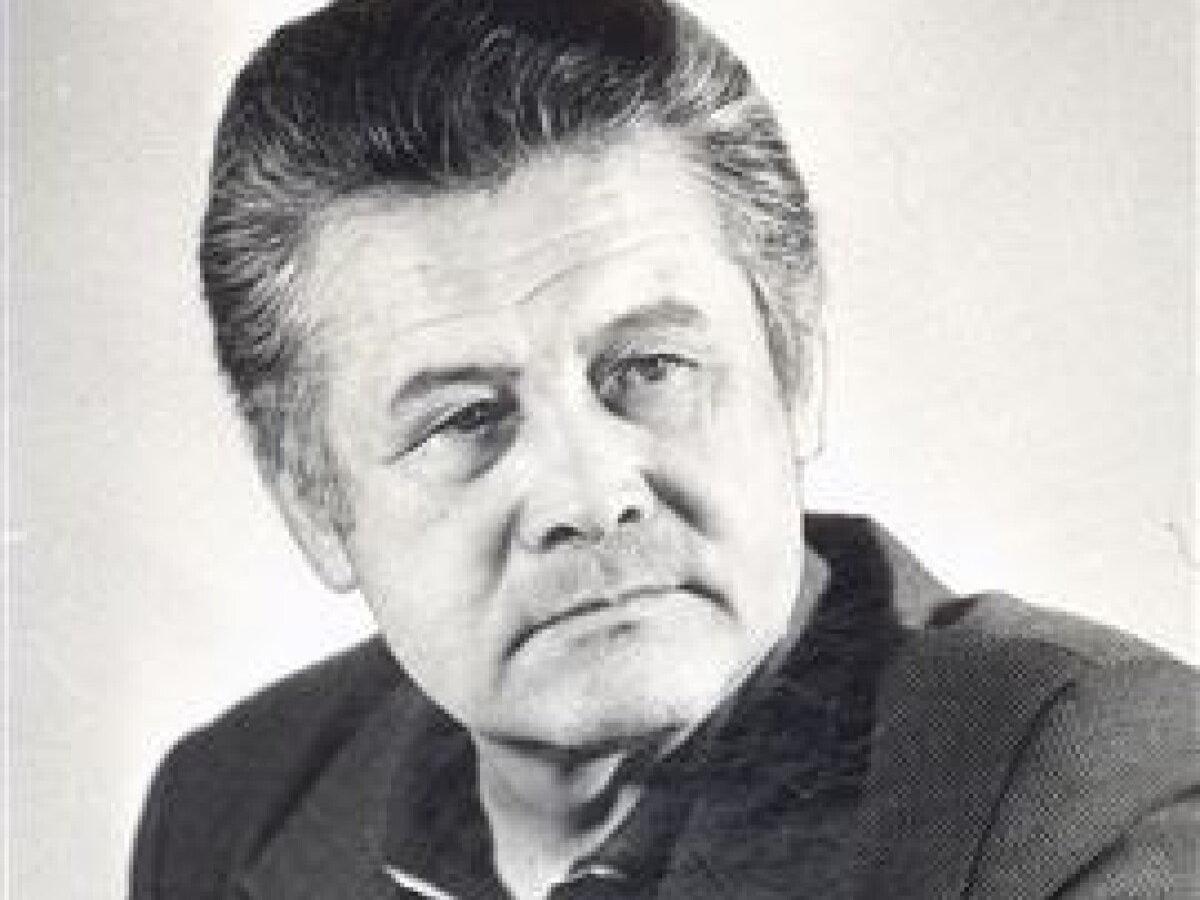
Berdibek Sokpakbaev
Berdibek Sokpakbaev is one of the most famous Kazakh writers, whose books have educated and continue to educate more than one generation of children. He was a person who was able to convey all the colors of childhood, its joys and sorrows, and also show the inner world of a child without embellishment. Berdibek Sokpakbaev was born in 1924 in a poor family in the village of Kostobe, Almaty region. His childhood was spent in difficult conditions, he lost his mother early, survived hunger, need and physical labor. However, he was always drawn to knowledge. Elder brother Satylgan, who later died in the war, played a key role in shaping the character of the future writer. It was he who instilled a love of books and learning. After school and service in the army, Sokpakbaev entered the Kazakh Pedagogical Institute named after Abai, where he studied philology. Later he continued his studies at the Higher Literary Courses in Moscow. He began his creative activity with poetry. His first collection of poems “Bulak” (Spring) has been released in 1950 and immediately resonated with readers.
Read more →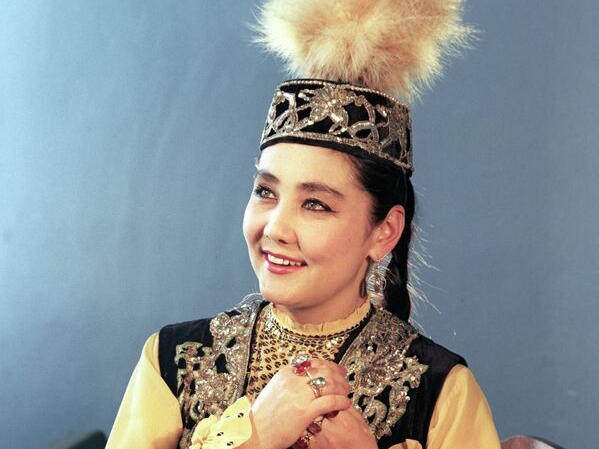
Bibigul Tulegenova
Bibigul Akhmetovna Tulegenova (born December 16, 1929) is a legendary Kazakh opera singer (lyric soprano), teacher, People's Artist of the USSR, one of the most significant figures in the history of Kazakh music. Her name has become a symbol of the highest skill, and her voice has won over listeners far beyond the borders of Kazakhstan. She was born in 1929 in Semipalatinsk (now Semey, Kazakhstan) into the family of a folk musician. From childhood, she showed a love for music, and her talent was noticed at a young age. In 1954, she graduated from the Kazakh Conservatory (now the Kazakh National University of Arts), where she studied with the famous teacher Kulyash Baiseitova. Her professional career began at the Abay State Opera and Ballet Theater, where she performed leading roles in classical and national operas. Among her best roles are Sarah in the opera “Birzhan and Sarah”, Azhar in “Abai”, Tatyana in “Eugene Onegin”. In addition to opera, Bibigul Tulegenova actively performed Kazakh folk songs, giving them special expressiveness and depth. Her unique timbre, purity of intonation and deep emotionality made her one of the best singers in the Soviet Union. She performed on the world's largest stages, representing Kazakh culture in Europe, America and Asia. For her services, she was awarded many awards, including the title of People's Artist of the USSR (1967), orders and prizes for her contribution to the development of art. In addition to her brilliant career as a singer, Bibigul Tulegenova was engaged in teaching, training young vocalists and passing on her invaluable experience. Her name has become a legend, and her voice remains a symbol of the beauty and greatness of Kazakh vocal art. An international vocal competition is held in her honor in Kazakhstan, and her work continues to inspire new generations of musicians.
Read more →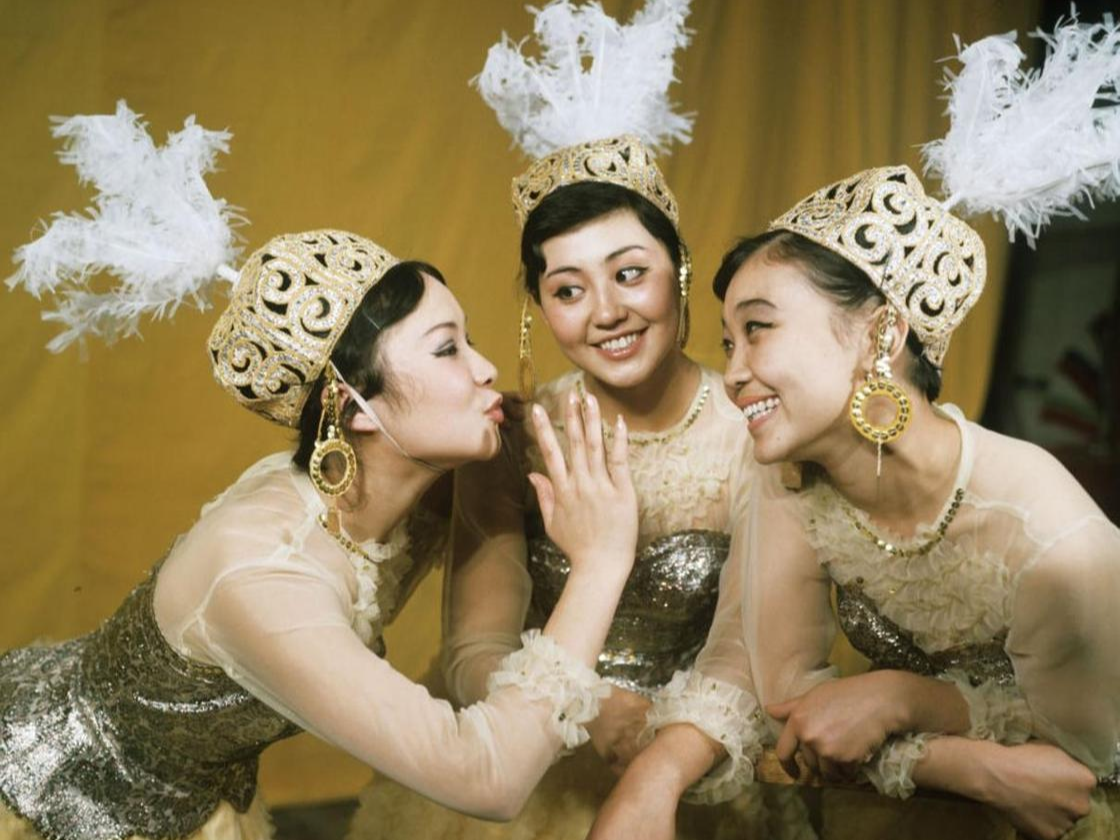
Ensemble "Gulder"
Group "Gulder" (Kaz. Gulder — Flowers) - legendary youth pop ensemble of Kazakhstan, created in 1969 by People's Artist of Kazakhstan Gulsara Galieva. The team announced itself with the first concert program “Steppe Tunes” under the direction of director S. Eleusizov.Since the 1970s, the ensemble has actively toured throughout Kazakhstan, and later abroad. Belgium, Germany, Malaysia, Cuba. In 1976, "Gulder" became a laureate of the World Festival of Youth and Students in Havana. dir="ltr" style="text-align: start;">People's artists of Kazakhstan began their journey in the team: Kairat Baibosynov, Kapash Kulysheva, Roza Rymbaeva, Saule Tynyshtygulova, Mayra Zhunusova and others. The ensemble's repertoire included Kazakh songs, dances of the peoples of the CIS and foreign countries. Among the concert programs are “Golden Dombra”, “Kazakh Patterns”, “Rhythms of Gulder”, “Blossom, Kazakhstan!”.Gulder combined folklore and pop, creating not just concerts, but bright theatrical shows. This ensemble became a forge of talent and a symbol an entire era in the culture of Kazakhstan.
Read more →